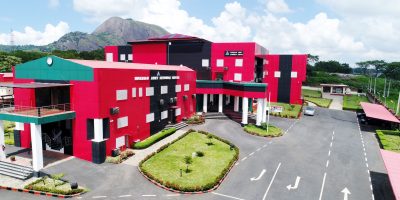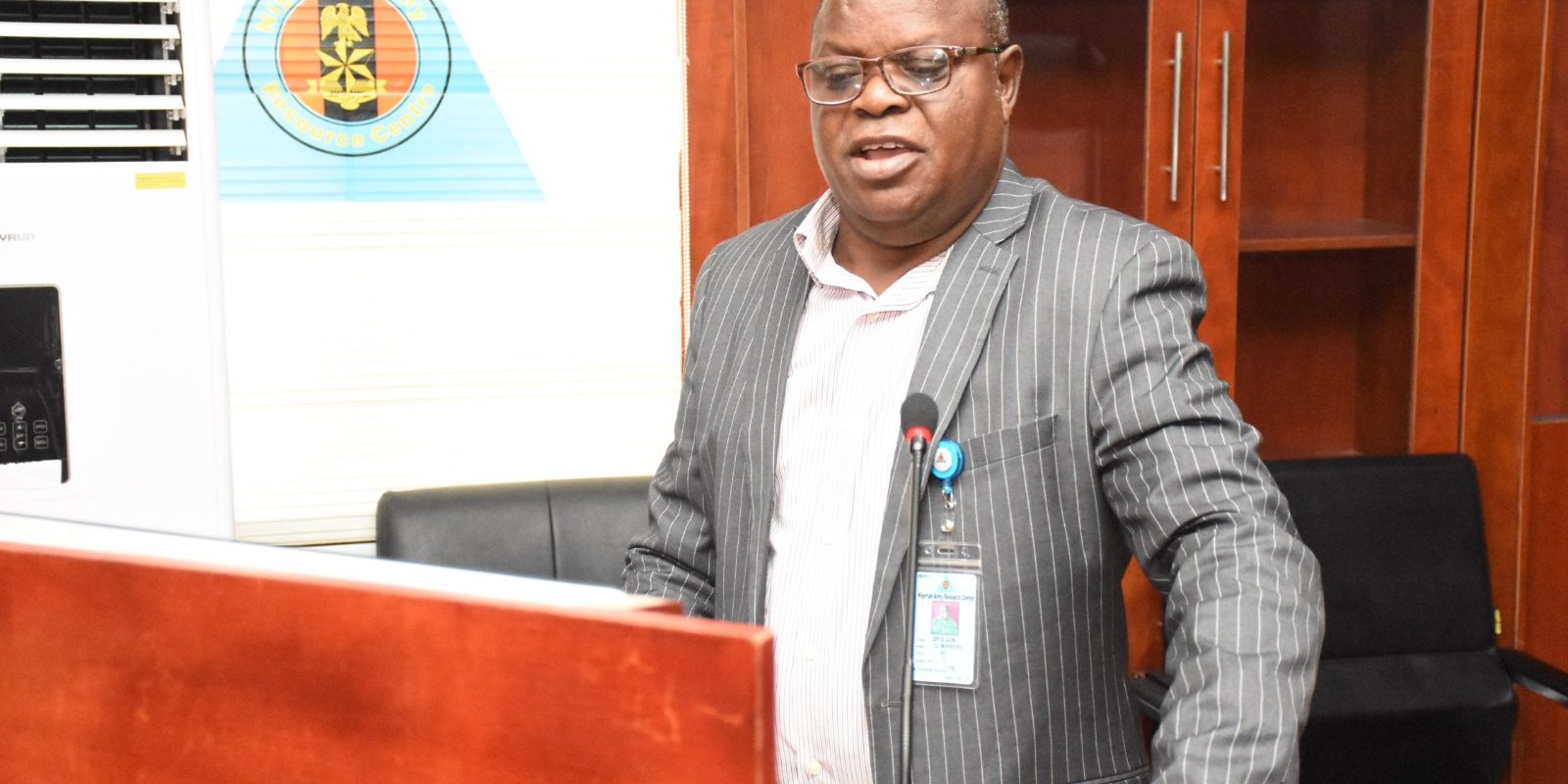NARC SENIOR RESEARCH FELLOWS AND SUBJECT EXPERTS MAKE PRESENTATIONS
The Monday, 27 January 2025, edition of the Nigerian Army Resource Centre (NARC) Weekly Subject Experts’ Presentation was held at Hall C, TY Buratai Block, Abuja. There were two presentations made by the Subject Experts on Nigeria and West Africa/Gulf of Guinea.
The first presentation was made by Brig Gen UJ Makbere subject expert on Nigeria, his presentation focused on, Niger Tanker Fire Death toll Rises to 98 – NSEMA. On 21 Jan 25, TVC News reported that the Niger State Emergency Management Agency (NSEMA) confirmed 98 fatalities from the recent tanker explosion in Suleja, Niger State, which occurred on January 18, 2025. Providing a breakdown of casualties, the agency’s Director General, Abdullahi Baba Arah, stated that as of 21 Jan 25, the death toll had risen to 98, while 69 individuals sustained injuries. According to Arah, the fire destroyed 20 shops, along with goods and properties valued at millions of naira. Additionally, 10 more patients with severe burns have been confirmed dead. Seven of these patients died at the General Hospital in Suleja, while three passed away at the General Hospital in Sabon-Wuse.
Abdulberqy Ebbo, the Special Adviser to the Niger State Governor on Digital Communications, shared updates on the situation via social media. At the General Hospital in Suleja, 43 patients were admitted following the incident. Out of these, seven have succumbed to their injuries, three were discharged to recover at home, 10 were referred to specialist centres in Abuja for advanced care, and 23 remain hospitalized with varying degrees of burns. The transfer of victims to Abuja was in line with President Bola Tinubu’s directive to relocate those affected by the explosion to tertiary medical centres for specialized treatment. Rabiu Ibrahim, media aide to the Minister of Information and National Orientation, confirmed this directive in a statement released on January 20, 2025. The explosion occurred when a fuel tanker overturned, spilling its contents and attracting a crowd attempting to collect fuel. This led to a devastating fire and explosion that claimed multiple lives.
In his analysis and lessons for Nigeria Brig Gen UJ Makbere noted that, the dangers of scooping fuel from a fallen tanker have resulted in repeated tragedies, often marked by fatalities, severe injuries, and environmental damage. This practice, while driven by poverty and ignorance, has created catastrophic consequences in Nigeria and other developing nations. Fuel tankers are a common sight on roads, transporting highly inflammable products. When these tankers are involved in accidents, the risk of explosion and fire becomes imminent, yet people, unaware or negligent of the danger, gather to scoop fuel. The risks associated with scooping fuel are immense, ranging from immediate threats like explosions and fire to long-term health complications and environmental degradation. When a tanker spills fuel, the immediate presence of gasoline vapors creates an extremely flammable environment.
A single spark from a cigarette, mobile phone, or even friction can ignite a massive explosion. As highlighted by the Federal Road Safety Corps (FRSC), the danger is compounded when people, often without protective equipment, gather around the tanker. Similarly, inhaling fuel vapors poses severe health risks. Prolonged exposure can cause respiratory problems, neurological damage, and organ failure. The World Health Organization (WHO) notes that gasoline contains toxic chemicals like benzene, which can cause long-term illnesses, including cancer, when inhaled or absorbed through the skin (WHO, 2020). Furthermore, fuel spillage contaminates soil and water, disrupting the ecosystems. The United Nations Environment Programme (UNEP) has reported that hydrocarbon pollution from such spills can persist in the environment for decades, affecting agriculture, aquatic life, and human health (UNEP, 2021).
He recommended that the NNPCL should expand and modernize the existing pipeline network to cover major demand centers across the country, ensuring a collaborative approach with private investors to fund pipeline projects and also the NNPCL and the Federal Ministry of Transport should accelerate the expansion of rail networks for freight transport, particularly in petroleum distribution.
The second presentation was made by Maj Gen OO Adeleke (Rtd) subject expert on West Africa and Gulf of Guinea, his presentation centred on, Liberia Successfully Installs and Commissions PSA Oxygen Plants in Four Counties. FrontPage Africa reported on 22 Jan 2025 that in a significant milestone for Liberia’s healthcare infrastructure, Pressure Swing Adsorption (PSA) Oxygen plants have been successfully installed and commissioned in Grand Kru, Grand Gedeh, Lofa, and Nimba counties. These plants are now providing medical-grade oxygen to hospitals, marking a crucial step in enhancing the nation’s ability to respond to health emergencies and treat critical respiratory conditions.
According to a release, the PSA oxygen plants are the result of a collaborative initiative involving key stakeholders, including the Ministry of Health, the Government of Liberia, the Global Fund Emergency Response, Plan International Liberia as Principal Recipient, and county administrations. This ground-breaking project underscores the commitment to strengthening Liberia’s health sector and its resilience to crises such as the COVID-19 pandemic and other respiratory diseases. These plants will enable hospitals to provide life-saving oxygen therapy to patients in need, significantly enhancing treatment capabilities and contributing to better health outcomes for citizens. This project demonstrates commitments to improving healthcare services in Liberia in collaboration with MOH and ensuring that every patient has access to essential medical resources.
In his analysis and lessons for Nigeria Maj Gen OO Adeleke (Rtd) noted that, Nigeria’s Health System comprises all people, institutions, resources and activities whose primary purpose is to promote, restore and/or maintain health, while health systems strengthening are strategies, interventions and activities designed to sustain health system performance. A strong health system is characterized by its ability to respond to emergencies while remaining resilient in promptly delivering high-quality routine essential services. Looking at the health situation in Nigeria, a report from WHO pronounced that almost ten per cent of newborn deaths globally in 2016, occurred in Nigeria.
According to UNICEF, Nigeria is responsible for a high number of under-five child deaths globally. An average of 20,000 Nigerians travel to India each year for medical treatment due to the absence of a robust healthcare system at home. Nigeria’s public health system is riddled with poor coordination, lack of accountability, little or no incentives to improve performance and lack of resources at the frontline. And whilst Nigeria was dealing with all these, the fight against the COVID-19 pandemic began. With the advent of the COVID-19 pandemic, regional, national, and local efforts were made by government and non-governmental agencies to respond to the pandemic.
Some of these health systems preparedness followed lessons from previous epidemics like the Ebola Virus Disease epidemic. Nigeria’s response to the COVID-19 pandemic has been mixed, with several successes and challenges. The country acted swiftly to close borders, impose travel restrictions, and enforce lockdowns in major cities such as Lagos and Abuja. The Presidential Task Force (PTF) on COVID-19, later transitioned to the Presidential Steering Committee (PSC), was established to coordinate the response. Nigeria leveraged its existing polio eradication surveillance infrastructure to track and contain the spread of COVID-19 effectively. Although initially limited, the country expanded its testing network from a handful of laboratories to over 120 molecular labs by 2021.
He recommended that Federal Government of Nigerian should train healthcare workers in emergency response and respiratory care techniques, recruit and retain skilled professionals, especially pulmonologists and anesthetists as well as provide continuous professional development and training programs for medical personnel.












